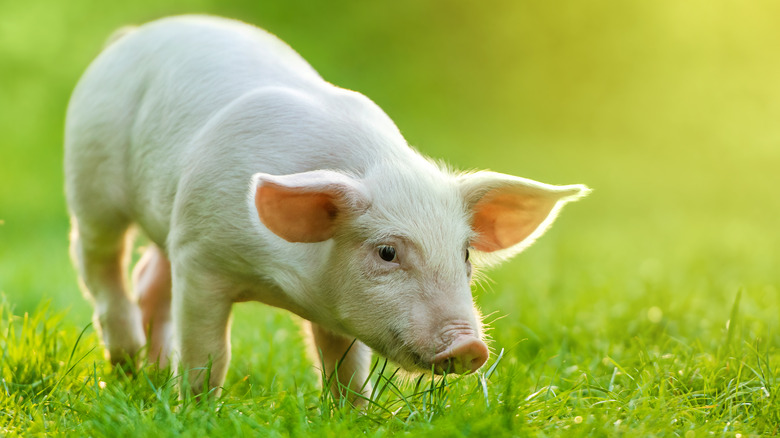This Is What The Bible Says About Pork
Humans have been eating the meat of pigs for an incalculable number of years, likely beginning with the first instance of a hunter-gatherer killing a wild boar and taking the meat home to his clan. Indeed, we even domesticated pigs about 10,500 years ago, according to Nature. However, for Jews and Muslims, pork is expressly forbidden by the sacred texts of both religions.
For the overwhelming majority of the world's Christians, however, the eating of pork is a non-issue. The reason for this apparent mismatch between the Bible's prohibitions on pork (and other "unclean" foods) and the fact that Christians eat it anyway has to do with later instructions about meat that came about in the New Testament. However, to this day, some Christians eat according to ancient Jewish dietary laws, meaning that pork is off the table — figuratively and literally.
The Old Testament is downright hostile to pork
The dietary laws in the Old Testament are absolutely and unambiguously against the eating of pork. Specifically, Leviticus 11 says that when it comes to land animals, God's people can only eat meat from beasts who chew the cud and have split hooves. For example, beef is okay, as cows have split hooves and chew the cud, but pork is out, as pigs do not chew the cud. To this day, many Jews eschew pork, whether for cultural or religious reasons, according to Modern Farmer.
The New Testament, however, complicates things. In Acts 10, the Apostle Peter has a vision in which God tells him that he's allowed to eat "unclean" animals (including pigs). Theologian John Oakes writes in Evidence for Christianity that most Christians have taken the view that Peter's vision is effectively a blank check for Christians to eat whatever they want, Jewish dietary laws notwithstanding. Similarly, writing in the Christian question-and-answer column Just Disciple, Karina Zolotarev points to Jesus' teaching that says it's not what goes into a person's body that "defiles" him or her, but what comes out. In other words, Christians can eat pork and other "forbidden" foods.
But that's not the end of it
The New Testament says more about pork, albeit indirectly, than just the passages cited above. As Grace Communion Seminary explains, much of the New Testament (outside of the Gospels) is given over to reconciling cultural issues between Christians who came from the Jewish tradition (and thus obeyed Jewish dietary laws) and those who came from the Greek tradition and had their own diets. Indeed, a council of early Christian leaders even convened to hash things out and decided that when it comes to eating, Christians should avoid eating meat sacrificed to idols — and from blood — to mitigate cultural conflicts between the two groups, as detailed in Acts 15.
But that is still not the end of it. Though for the majority of the world's Christians, the conflict between Jewish and Gentile Christians worked itself out centuries ago, a handful of believers still stick to Jewish dietary laws for theological reasons that won't be explained here. As The Chicago Tribune noted, examples of such Christians include Messianic Jews — who want to restore Jewish tradition and worship in Christianity — and Seventh-day Adventists, who actually strive towards a plant-based diet. Per Healthline, the latter group eschews pork and other "unclean" animals when they do eat animal products.


